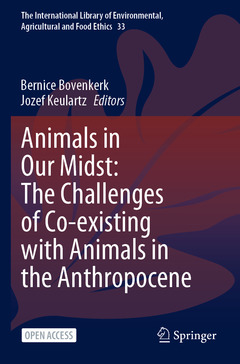Description
Animals in Our Midst: The Challenges of Co-existing with Animals in the Anthropocene, 1st ed. 2021
The International Library of Environmental, Agricultural and Food Ethics Series, Vol. 33
Coordinators: Bovenkerk Bernice, Keulartz Jozef
Language: English
Publication date: 03-2022
Support: Print on demand
Publication date: 04-2021
579 p. · 15.5x23.5 cm · Hardback
Description
/li>Contents
/li>Biography
/li>Comment
/li>
This Open Access book brings together authoritative voices in animal and environmental ethics, who address the many different facets of changing human-animal relationships in the Anthropocene. As we are living in complex times, the issue of how to establish meaningful relationships with other animals under Anthropocene conditions needs to be approached from a multitude of angles. This book offers the reader insight into the different discussions that exist around the topics of how we should understand animal agency, how we could take animal agency seriously in farms, urban areas and the wild, and what technologies are appropriate and morally desirable to use regarding animals. This book is of interest to both animal studies scholars and environmental ethics scholars, as well as to practitioners working with animals, such as wildlife managers, zookeepers, and conservation biologists.




